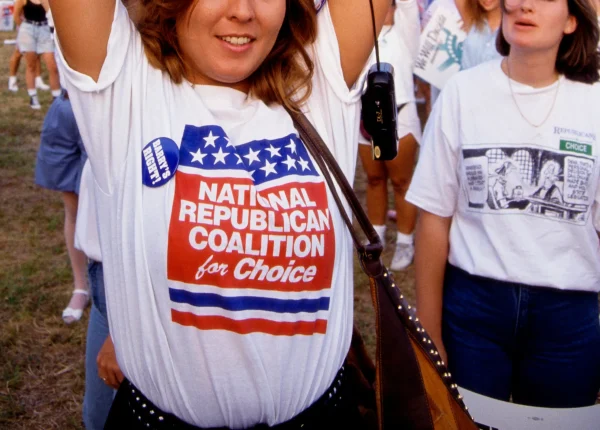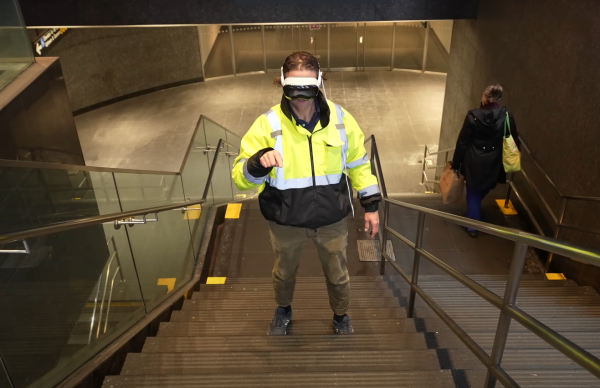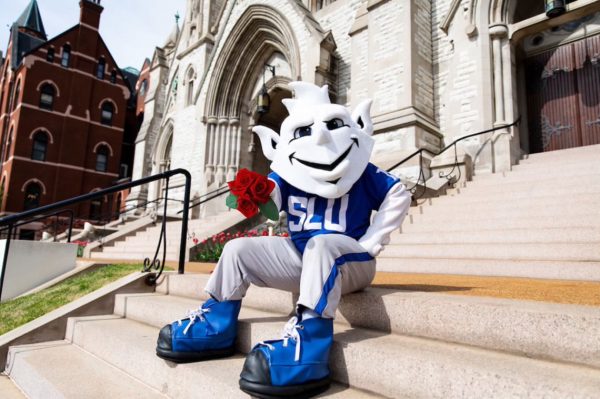There’s More at Stake in SLU’s Abortion Debate than You Might Think
On November 9, a small pro-choice protest broke out in front of Morrissey Hall, where Students for Life had set up a memorial representing the hundreds of thousands of abortions in the United States. The pro-life group and their supporters arrived to stand guard over their memorial as it had been dismantled (as it has been nearly every year I’ve been here) in a now-viral video. It was a tense night, with protesters on both sides covering up and taking down each other’s signs and stiff philosophical arguments were met with passionate cries from personal experience. By the admission of many present there, not many minds were changed.
The same lack of changed minds came when a more organized protest took place the next night. Much of the night entailed pro-choice students chanting while pro-life students prayed and kept vigil at their pro-life memorial. Significantly, though, the pro-choice students managed to place a memorial for women who have died from medically unsafe abortions. After a somewhat organized dialogue between the two camps, both left and dismantled their displays.
I was present both nights, navigating through groups of pro-life and pro-choice students, introducing myself as a scholar and instructor in rhetoric and argumentation. I was thrilled that students were willing to talk to me and answer the questions I had for them. Despite being Catholic and pro-life, I was not particularly interested in their stance on abortion. Rather, I simply asked: “Why are you here,” and “What’s at stake for you tonight?”
I got a wide range of answers. People in both camps were similarly pessimistic that the others would change their thinking, but they still put their views out there. Those who were most passionate put themselves – their stories, their beliefs, their bodies – at stake because they thought it might spark one person just to think a little more about their position. They thought their vulnerability might contribute to dialogue, conversation and perhaps even friendship. It may surprise people that the people who called pro-lifers ‘racists’ or who tore down “Stand with Planned Parenthood” signs were the same ones who were willing to get to know their opponents, joke with them, shake hands, hug, and pet their dogs. Those who were the most level-headed were the least likely to get anywhere, and the most likely to say they had nothing personal at stake.
I can’t speak for everyone there, nor can I speak for anyone fully. Certainly, as a straight, white, Catholic man, I cannot account for the experiences of Black, female, and/or LGBTQ+ students who were there – nor do I wish to. What I can say, though, is that there was a fascinating common ground between most of the students at the protest. For many of the students there – pro-life or pro-choice, conservative, liberal, or otherwise – what was at stake in their arguments, at least implicitly, was their stake in the SLU community.
That, I think, is the factor in this debate we have to attend to as a whole community. We have to confront this issue, no matter what our stances are on abortion or no matter to what extent we want to participate in or avoid the abortion debate. For people defending the right to life for unborn children, and for those defending women’s rights to bodily autonomy and physical, emotional, and financial stability, what SLU means to them – what they believe SLU is or ought to be – was a major premise in their argument.
Nonetheless, just because it was common ground does not mean SLU’s identity was a settled question that night. Many of the pro-life students I met saw this loud, passionate protest as a sign that SLU was not living up to its Catholic identity. Many of the pro-choice students argued the inability to start a chartered pro-choice student group essentially deprived them of their right to free speech on campus, especially in contrast to the College Republicans, who have invited right-wing provocateur Matt Walsh to speak here in December. These camps disagreed on what they believed SLU to be as an institution, or what they believed is actually in accord with our university’s mission and identity. What they agreed on, even if they did not say so explicitly, was that our very mission and identity were at stake. Indeed, it’s the university itself – the community, the motivating beliefs, the institutional structure, and certainly the physical space – that are at stake.
For the people I met from both sides, the issue of abortion brought conversations about their financial burdens as a college student. Some of the pro-choice women I met emphasized their massive student debt as a reason that an unplanned pregnancy would compromise their future. The pro-life people in conversation with them would often respond that they had similar debt, and that they could sympathize with that concern. This financial burden was just one of many of the emotional, physical, and otherwise personal pains that pro-choice women cited as reasons for their beliefs and, more importantly, for their passionate presence. Really, I think this was why the Students for Life modified their memorial to include advertisements for free pregnancy and feminine health resources. This was a common thread for at least some on both sides of this tense event. Whether because of their religious identity, their financial burdens, or their ideological commitments, students there felt that their participation in SLU, their membership in our community, was at stake.
That, I think, is an often-disregarded part of this discourse on our campus. At least, it is disregarded insofar as no sustainable effort is made to address it. An email that came from Dr. Pestello’s office announced dialogue sessions on Catholic teaching on reproductive rights and healthcare and the nuances of policies and practices surrounding the issue of abortion. I think these sessions could be useful and meet students’ needs, but my question is whether they will allow us to talk about what impedes members of SLU’s community from feeling they have the right to full participation in our university’s intellectual, social, religious, and cultural life.
Based on what I heard from people in both camps, that was the significance of the pro-choice memorial on the second night. Having that space organized across Spring Street created a sense of fairness and equality during that night’s dialogue. One person I met described it as raising the stakes and keeping everyone honest – if the pro-choice students tried to dismantle the pro-life display again, the pro-lifers might do the same. (Though I cannot assume the pro-life students would, in fact, do so.) It was an inventive use of a space that allowed both camps to participate fully, even if only one had full institutional approval.
Yet despite Dr. Pestello’s email, and despite the pro-choice camp successfully setting up their own protests and display, I think we can put into words what SLU’s institutional voices won’t directly say about this debate. Even with the prominent presence of pro-choice students and faculty, of whom some also identify as Catholic, SLU as a Catholic institution is committed to the Vatican’s moral teaching. The Vatican, of course, is rather explicit on the issue of abortion. The Catechism calls abortion “intrinsically evil,” and Catholics who procure or assist in an abortion risk excommunication, unless they receive sacramental reconcilation. This certainly should not impact the way SLU treats students; discriminating against students who procure or help someone with obtaining an abortion would directly contradict the mission of Ignatian pedagogy. What it does mean, though, is that so long as SLU as an institution is bound by Catholic teaching, the institution – and the land on which it operates – likely won’t be equally accessible to pro-choice and pro-life camps. We stand on uneven ground.
So, where do we go from here? We find common ground insofar as we believe SLU itself is at stake, but even if the grounds of West Pine are common to us, they are not neutral. But I don’t think partiality is a vice here. As I said earlier, it was those who performed a ‘neutral’, level-headed argument at Tuesday night’s protests who made the least progress and the fewest personal connections. But even for those who play neutral or unaffected, partiality is unavoidable, including for SLU’s administration and even SLU’s physical spaces. The question is how we negotiate our relationships with one another, with the institution, and with our physical space when everyone and everything involved is biased in some way.
If you want my opinion, I think what we need first and foremost is reconciliation. I don’t mean the Catholic sacrament; I mean the process of accounting as best we can for the roots underlying our own beliefs, and for the beliefs and roots of those we oppose. I mean actually studying the ideological or religious commitments we have (and, crucially, that our opponents have) in as generous and inventive a method as possible. I mean accounting fully for the harsh realities that women inside and outside of our community face. I mean putting more of ourselves at stake, instead of pretending that we are unaffected by encountering people with whom we disagree, or who counter our narrative of the world around us. I mean more of us putting ourselves through the emotional labor that is already disproportionately taken up by women and/or students and faculty of color. I mean being able to look at our own wounds, and taking care not to pick at the wounds of others. And I mean articulating just what is at stake in or because of the spaces we occupy. In the end, we have to invent new paths forward and new relationships from those imperfect parts of who or what we are — as people, as a community, as a place. That’s how we reconcile.
I don’t know how we should accomplish this practically; one man determining how a whole university community should come together is a terrible, horrible idea. But it’s not as though university administrators can somehow descend from the labyrinths of DuBourg Hall and put everything at peace, unless they take the path of silencing, distracting, or scapegoating. Such work is left to us. And we can’t end every night by going back to our camps and patting ourselves on the back for having a good dialogue. Reconciliation is continuous, ever-demanding work.
I hope that maybe my admission that I write this as someone who is Catholic, white, male, straight, and pro-life does the work of putting myself at stake – and of helping you take more full account of where I am coming from. Perhaps it makes you more aware of your own beliefs, your own roots, your own biases, whatever is at stake for you – even if you think my voice is unwelcome in this discussion, which I would understand. I acknowledge I write this article from a place of privilege. Because that’s the work that needs to be done. If we can’t come together and speak frankly about what’s at stake for everyone in this university community, and how the physical and institutional constraints of our university affect all of us, I don’t think we have any hope of making any sort of sustainable progress in this or any other debate on campus. That’s what’s at stake in SLU’s abortion debate.
Your donation will support the student journalists of Saint Louis University. Your contribution will help us cover our annual website hosting costs.











Ronald Slater • Nov 18, 2021 at 4:51 pm
Without question, the most effective lie of the pro-abortion movement is the allegation that thousands of women died of illegal, unsanitary abortions each year before the procedure was legalized.
However, a simple statistical analysis shows that pro-abortionists are lying about illegal abortion deaths all over the world.
First, the Pro-Abortionists Admit the Lie.
No evidence exists to support this spurious claim. For example, Dr. Bernard Nathanson, one of the founders of the National Abortion Rights Action League (NARAL), and the former owner of the largest abortion clinic in the world (the Center for Reproductive and Sexual Health, or C*R*A*S*H) states in a quote widely used by pro-lifers to highlight the dishonesty of pro-abortionists.
“How many deaths were we talking about when abortion was illegal? In NARAL [the National Abortion Rights Action League], we generally emphasized the frame of the individual case, not the mass statistics, but when we spoke of the latter it was always ‘5,000 to 10,000 deaths a year.’ I confess that I knew the figures were totally false, and I suppose the others did too if they stopped to think of it. But in the ‘morality’ of our revolution, it was a useful figure, widely accepted, so why go out of our way to correct it with honest statistics? The overriding concern was to get the laws eliminated, and anything within reason that had to be done was permissible.”
And pro-abortion propagandist Marian Faux confirms the lie in her recent book Roe v. Wade: “An image of tens of thousands of women being maimed or killed each year by illegal abortion was so persuasive a piece of propaganda that [our] movement could be forgiven its failure to double-check the facts.”
Malcolm Potts, one of the original international activists who helped spread abortion throughout the world, claimed that “Those who want the [abortion] law to be liberalized will stress the hazards of illegal abortion and claim that hundreds, or thousands, of women die unnecessarily each year when the actual number is far lower.
Even the Neofeminist “bible”, called “Sisterhood is Powerful”, recognized that “A study made in the 1930s, before the development of antibiotics made even illegal abortion less deadly than it used to be, came up with this number of 10,000 deaths; but it is no longer anywhere near the truth and has no place in any serious discussion of abortion.”
The “Official” Figures.
According to the United States Bureau of Vital Statistics and the Centers for Disease Control, the last time 1,000 women died of illegal abortions in the United States was in the year before penicillin became widely available to the public in 1942. In the ten years preceding Roe v. Wade, deaths ranged from 90 to 150 per year.